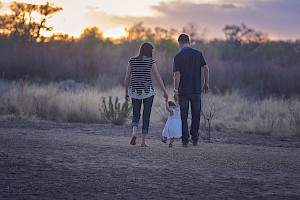We are all so busy these days with work, looking after the kids and pets, social activities, appointments etc. Sometimes it is nice to take a step back from it all and get out in nature. Going for a walk can be beneficial to us all in so many ways. There are also numerous ways that we can make walks fun and engaging for everyone.

1. Make a map of the route to follow before each walk.
- Develops planning and spatial awareness.
- Supports development of road safety and awareness – talk to your child about where the roads are, what type of crossing it is (pedestrian crossing with lights, zebra crossing etc) and how to approach each type of crossing, what road safety skills we need to remember when crossing (stop, look, listen, think).
- Include things like walking along a small stable fence to build balance skills, jumping between concrete squares or tip-toeing along pavers.
2. Treasure hunt - Build a treasure hunt list for items to find whilst on a walk (e.g. a rock, a koala in a tree).
Builds organisation and categorisation skills.
- Supports visual tracking skills when scanning their environment to look for items.
- Ticking items off the list as they are found can also give opportunities to practice handwriting skills including how to hold a pencil.
- If collecting items as you find them, a pincer grasp may be used and allows this to continue developing.
3. Stop at the park
- Let the children make up their own games to play – supports their creativity and social skills with other children.
- Bring along equipment with you for playing various games such as a cricket set.
4. Animal Walks
- There are countless animal walks that you can model and encourage your child to engage in whilst walking – whether in a park on grass or a safe walking track.
- Animal walks build core strength, coordination, motor planning, upper-limb strength, shoulder-stability and body awareness. They can be modified to suit your child’s skill level.
5. Play ‘I spy’ whilst walking.
- Builds visual tracking skills.
- Develops cognitive skills and concept awareness.
- Supports turn taking skills.
- Supports emotional regulation skills when experiencing disappointment.
6. Builds emotional regulation strategies.
- Going for a walk is a common strategy taught and is also commonly accepted to ‘cool down’ when experiencing heightened emotions. Fresh air and getting amongst nature can be calming for many people as we can enter a meditative state.
- By moving our body, we can distract our minds from problems and lets us talk about things in a less defensive manner.
- Modelling this to children supports their understanding and builds their awareness of strategies that they may feel comfortable with using.
7. Talking with your child.
- Sometimes we feel disconnected from our family walking can be a great opportunity to slow down together and open up to each other to feel more connected.
- Talking builds social skills, event recall skills, and emotional regulation skills.
- Builds healthy relationships with children.
8. Exercise!!
- Going for a walk is a great way to get some exercise without the intensity. It is recommended that as adults we get 10,000 steps EACH DAY! Often, this number can be hard to achieve depending on what our lifestyles are like, the jobs we work, how much we drive etc. Walking supports a healthy lifestyle and encourages our kids to do the same and to help them with building healthy habits and routines for when they are adults themselves.
- Gets kids away from the TV and video games and encourages conversation and creativity.
- If you have a dog, take them along with you (they need it just as much as we do). This also teaches responsibility and awareness of others feelings/needs/wants.
So, get out there and go exploring – see what amazing things you can find whilst building on important skills with your child.
Related Blog Posts
If you liked this post you may also like:
50 activities for senses
20 tips for social skills
Supporting Your Child While They Do Homework
Summer fun!



